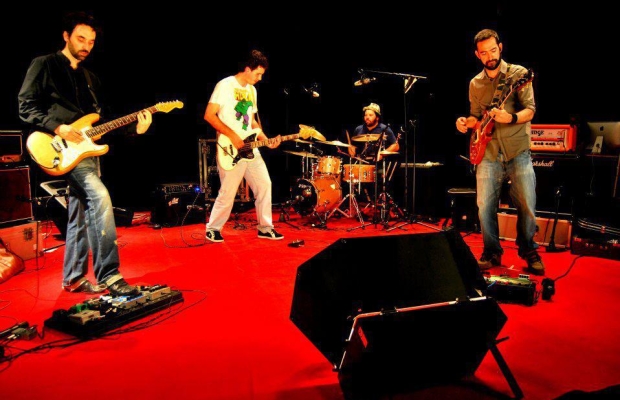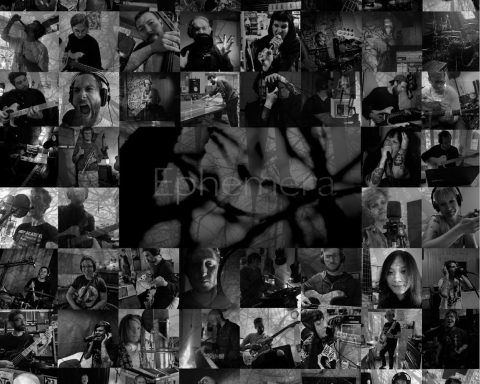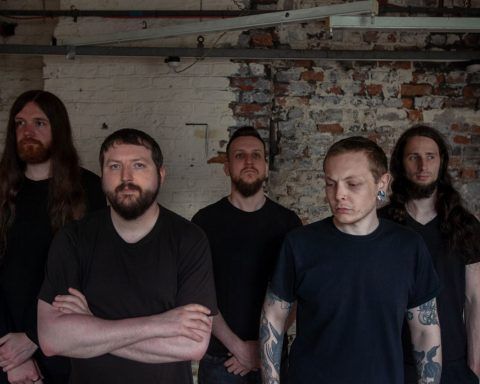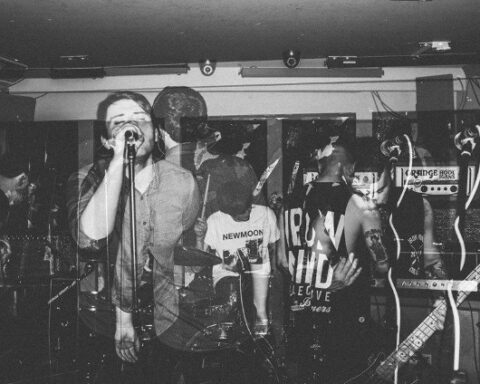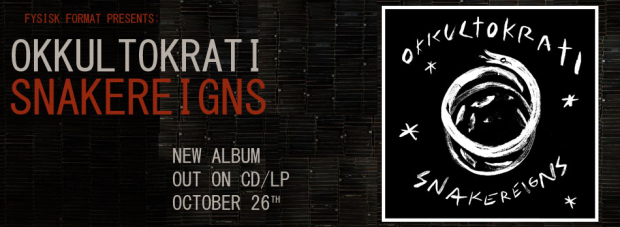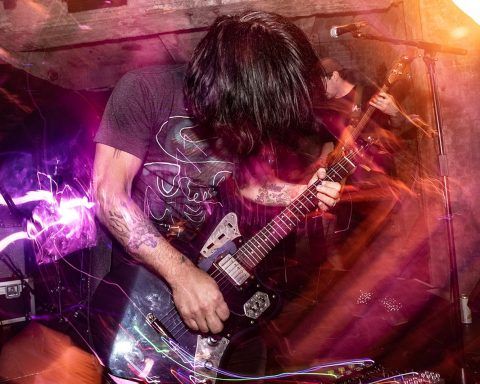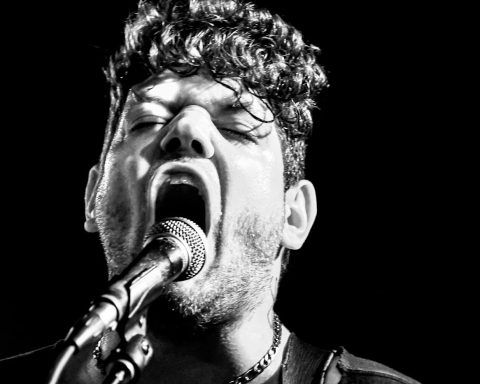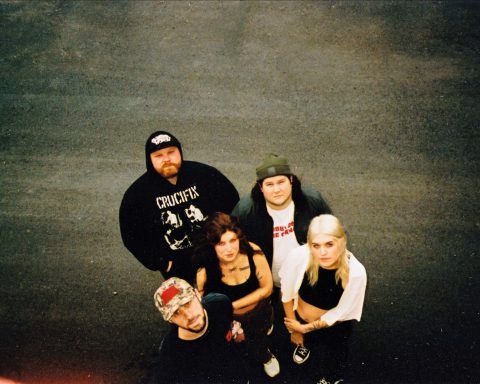We are proud to give you a unique chance to meet or learn more about one of the most interesting European instrumental post-rock / jazz projects – KERMIT. The band was born from the desire to experiment with the endless possibilities offered by two guitars, a bass and a drumkit. The result is a landscape of multiple textures that make sense when played together, only when superimposed. KERMIT is a melancholic trip that is sometimes subtle and tender, and some others aggressive and heartbreaking.
Miguel A. García Otarola from Modernicolas says it all: “[…] this post-rock band from Malaga is fond of extensive crescendos, tiny twisting noises, sound landscapes, Martian guitar sounds and, above all, tastefulness. That’s KERMIT. The notes played by their guitars travel through different sound machines that mould them to create pure sound landscapes: intertwining pictures of the Caribbean and the Antarctica seen through a looking glass. You watch these pictures while the breeze caresses your feet. It’s the bass and the drums that set the beat of the pieces. I know that the term ‘pieces’ is somewhat pretentious, but… if there is no singer, how are we going to call them ‘songs’? […]”
Hey! Great to have you here, mate. There’s not too much about KERMIT online. I decided to be a part of the change [smiles]. How have you been recently?
Hi! It’s a pleasure for us to be here, as we really enjoy your website.
KERMIT is a project that is still in baby stages, yet it is growing very quickly. We are currently working very hard to make it grow.
Gonzalo, Miguel and I started writing songs in the summer of 2011. We met now and then and enjoyed writing and playing instrumental songs (2 guitars + bass). Gonzalo and I had a common background in local Malaga alternative bands in the late 1990s and early 2000s. When these bands went into hiatus, Miguel and I shared a 4-year (2006/10) experience of a reasonably successful PEARL JAM and grunge tribute band, Seattle Apples, that allowed us to play numerous gigs in our hometown and go on a brief tour across Andalusia.
Alvaro joined us around February, thus shaping the current line-up of the band and contributing a completely different background. He used to play either the guitar, the saxophone or even the bass in metal, jazz and fusion bands, respectively, back in his native Chile and Barcelona, where he lived for some years. Besides, he was finally fulfilling a teenage ambition: playing the drums. He had been practicing for around 3 years when he joined KERMIT behind the drums. His playing style fit our expectations like a glove and made Kermit, more than ever, a multi-faceted band.
Soon was KERMIT playing gigs in Málaga to find excellent reception of its instrumental proposal, and made it to the final stages of some music contests, being awarded a third place in a pop-rock contest at Andalusian level in August.
KERMIT entered the studio in late June and spent the summer working on our 12-song debut album (mixing, mastering, art working, etc.), which shall be presented in a concert on Thursday November 22nd in Teatro Echegaray (Málaga), and made available through our website and BandCamp site.
Great, man! That’s what I call a full-scale introduction [smiles]. Let’s talk those early projects of yours. What music have they focused on? What are some of the biggest achievements you’ve made with them?
Alberto, Pedro, Gonzalo and I were neighbours in our childhood and went to the same school. We formed our first band, PARCEL, back in the late 1990s, in our teenage years. We wrote our first songs and Sergio joined on vocals in 1999. The quintet recorded a 9-track demo in a local studio and subsequently went through different periods and styles such as grunge, emocore, numetal, post-rock, post-hardcore, noise rock, math rock, shoegaze, hardcore punk, trip-hop, and NY hardcore. Finally Sergio left the band in 2003. Unfortunately, we have no recordings of all that hard work.
We started then to revisit classic pop-rock references from the 1960s, 70s and 80s under a new name: BANDA APARTE (a tribute to Godard’s film). We wrote some good songs, but Alberto and Gonzalo moved to Madrid in 2006, and BANDA APARTE finally disbanded.
Pedro and I then joined Miguel and Guille to form PEARL JAM tribute-band SEATTLE APPLES. We started playing Pearl Jam covers and ended up playing covers of a wide variety of bands such as NIRVANA, ALICE IN CHAINS, SOUNDGARDEN, STONE TEMPLE PILOTS, FOO FIGHTERS, THE SMASHING PUMPKINS, TOOL, RAGE AGAINST THE MACHINE, QUEENS OF THE STONE AGE, BUSH, MUSE, COLLECTIVE SOUL, SUNNY DAY REAL ESTATE, etc. Seattle Apples played lots of gigs in its 4-year existence in Málaga and Andalusia, and finally disbanded in 2011. It was an excellent training period.
Kermit began when Gonzalo moved back to Málaga and joined Miguel and me to write our own songs, as we had grown tired of covering someone else’s songs. Gonzalo nowadays also plays the guitar in the sludge band POINTLESS.
Alvaro played the guitar, the saxophone, and the bass in several rock projects in the line of King Crimson when in Chile, and then took part in several jazz projects in Barcelona as a drummer. Curiously, he had also played in a PEARL JAM cover band as a teenager. Nowadays he also leads the nujazz trio PROYECTO PARADA behind the drums.
Ok, let’s go back to “Autoficcion”. How did you decided to release it via Itaca Records? What’s the range of this distribution channel and what are the formats that you use?
We considered several independent labels that were interested in our work, yet we wanted to keep complete command over the project (and our professional lives), so we finally decided to launch our debut album through our own record label (Itaca Records), which, by the way, is a rather common strategy for Spanish and foreign bands nowadays, given that the structure of the music industry as we know it seems to be crumbling down, though it’s difficult to guess what’s coming next.
We have chosen to launch a 9-song solid-white vinyl edition, and a 12-song CD version so as to assure a perfect listening experience to our fans, and cover the most widely used formats nowadays. Album download will also be made available soon.
It’s for distribution that we’re going to work with some labels. For instance, downloads are meant to be managed by German label Pinmusik, while vinyls and CDs are meant to be distributed initially through BandCamp, though there are some labels interested in distribution across Europe and the States.
Which brings us to the subject of awareness of your music abroad. What’s the farthest place you received positive feedback from?
Although alternative music scene in Spain has grown much in the last years, it is still far from those in other European states, the States and Australia, so we have always considered playing and being listened to in those scenes. Now this has become easier through the Internet. Indeed, we have already received positive feedback from numerous places around the globe, including Argentina, Bolivia, England, Russia, France, and Germany.
What’s the farthest you have been away with the band?
As we have already mentioned, KERMIT is still a baby project, so the farthest place we’ve been away with the band is probably Marbella, that is 60 km from our hometown, Malaga, in Costa del Sol. However, we’re playing some dates in Antequera, Granada, Córdoba, Jaén, Seville, Cádiz, Badajoz, Tenerife, and Madrid soon with post-rock band Autumn Comets (from Madrid). [That seems a lesson on Spanish geography] [laughs].
We have also signed with German label Pinmusik for exclusive online distribution, as well as vinyl distribution, of our first album, Autoficción, so we’re likely to have to some dates in Germany in summer 2013.
What would be your dream festival / venue to play at?
I think every alternative, indie band would like to play festivals such as Lollapalooza, Coachella, Reading, Glastonbury, Benicassim, etc. Indeed, there is a quite interesting summer “pitote” festival in Málaga known as Canela Party that would also be very attractive for us to play in, as they have always cared for and promoted minority styles such as hardcore and post rock. We enjoy playing our music live, so every festival is welcome.
However, we honestly think that small venues benefit our project and shows, as our music tends to be rather intimate and detail-based. We’re now delivering an audiovisual show with videos by Omar Alonso and texts, and definitely think that smaller, warmer venues fit better our idea of a good concert (see this video in an alternative theatre-like venue (100-150 people).
Definitely. I love places like that. So, summing it up, what future shows do you have already booked and what else can we expect. People need to put this in their calendars [smiles].
Promptly we are visiting Antequera, Seville, Granada, and Córdoba on November 16, 17, 23 and 24 with Autumn Comets, and are presenting “Autoficción” on November 22 in Málaga. There are still two dates in two festivals in December, but they have not been fully confirmed yet.
What is the local Malaga music scene like?
Local Malaga scene is nowadays producing some good and interesting bands, with whom we usually share gigs now and then. There is an increasing number of amateur and semi-professional musicians playing all non-classical music genres. There is also a bunch of pubs/bars playing this music on their stereos. This is the good part of it.
The bad side of it is that music receives scarce to null attention from local and regional authorities, as pop-rock music is rarely considered cultural expression, but just entertainment for the youth. Bars, pubs and small venues find it very difficult, almost impossible, to obtain licences to organize concerts and live events downtown, where people usually go out at night. Therefore, the number of venues offering live music is rather low.
Besides, Malaga lacks of a proper venue to hold concerts in. Although the very few venues that I have already mentioned have made great refurbishment efforts to provide the best possible conditions for live music (www.velvetclub.es), they are still only acceptable, far from appropriate. Unfortunately, this lack of authorities’ support is also the case in many other Spanish towns such as Seville and Granada, yet these towns do have at least one or two appropriate venues to play in (e.g., www.malandar.net, www.funclubsevilla.com, and www.plantabaja.net).
And what about practice places? Where do you rehearse? How many hours a week?
Now there are lots of rehearse places in Malaga where bands pay a fixed amount to rehearse for a fixed number of hours a week, and also offer musicians the possibility to keep their equipment for a surplus.
However, we have rented our own rehearse place since 2005, so we can rehearse at almost any time we want and as much as we can –that is, as much as our professional lives allow us to! [laughs]
It took us a great physical effort and some time to fit out our place. It is an 11-square-metre room. We covered the walls with wood sheets and the floor with carpet. Now is a really cozy, red-lighted place where we usually rehearse once-to-twice a week.
Looks very nice. Cozy. [smiles]
Oh, thanks! It’s a little bit narrow but it’s also quite warm. You’re welcome any time you come around Costa del Sol.
Thanks!
Would you see a vocalist there some day? [smiles]
We expected that question sooner or later, and we’re glad you made it. At first we wrote songs thinking of a future vocalist to sing lyrics on them. We auditioned some vocalists, but none of them suited us. We were a bit worried about it, but we also toyed with the idea of writing and playing instrumental songs.
When you’re in a conventional band, vocals usually take from 60 to 90% of prominence, let’s say, time. In an instrumental quartet prominence is then divided between the guitars, the synth, the bass, and the drums, so we found that playing instrumental songs was far more fun/interesting than playing for a vocalist in a more-or-less traditional band. Besides, an instrumental band is somewhat an innovative project in Spanish alternative poprock scene.
Now we think that lacking a vocalist has finally turned into a positive aspect for us, as it makes KERMIT unique.
True. And oh, by the way, I forgot to ask you [smiles]. Why KERMIT?
Choosing a band name can be a really difficult task if you expect to find “the name that defines de band, your music, its spirit, etc.”, simply because it doesn’t exist. You may look for it for ages…
We wanted a proper name; that is, a name that meant nothing. We knew music would make it meaningful We thought of some such as Marlowe, Kowalski, and others, yet we don’t know why KERMIT made it to the end. Possibly because it is easily read in almost every language. The muppet was a nice and warm precedent, but it was by no means a defining factor in our decision.
[laughs] … and you know what? I bet people are still seeking for some sort of secret meaning behind it anyway. And they say to themselves: “no way, it can’t be it, Kermit must be more than that” [laughs].
[laughs] There is always some kind of Kabbalah going around the origin and meaning of band names. Maybe we’d better answer this question more wisely and try to cast some mysticism on its choice… yet this is how it was.
Alright… tell us, do you have any other musical activities besides KERMIT?
Yeah, some other projects run parallel to KERMIT. Miguel and I play for no other band, and I think we can say that KERMIT is more than enough. Obviously, we do have other music interests, but we’re currently working so hard with KERMIT that we can hardly find any time to do anything else but working and having some time with our families.
On the other hand, Gonzalo and Alvaro are plenty of energy and do have parallel projects. Gonzalo plays the guitar in the sludge band POINTLESS, who are entering the studio shortly. Alvaro is a professional musician and plays with several bands. He also plays the bass in a fusion band, LOS MALAMENTE, and leads his own nu-jazz project, known as PROYECTO PARADA, behind the drums.
Great. Good to hear you’re so active, guys.
Besides the music, have you attended La Tomatina this year? [smiles]
No, sorry. We’re not that fond of those traditions, but some people who usually attend it say it’s really relaxing, somewhat distressing.
In August we also have important fiestas here in Malaga, where people from town and many visitors drink, eat and party almost all day long for nine days. Although it is very appealing to some, it does not fit our entertainment taste that much. We prefer simpler pleasures such as listening to music, reading, watching films, spending a day in the countryside, going cycling, travelling, dining out, etc.
I can’t begin to tell you how proud of you I am for this [smiles]. And what do you think about corrida? A legal cruelty? Or just a tradition?
That is a really tough one, isn’t it? You may be unaware of the fact that it’s a hard question for Spaniards. I shall begin saying that I haven’t ever attended a bullfight, in spite of Malaga’s strong bullfighting tradition. I’ve only visited Malaga bullring to watch Bob Dylan play live in 2000.
Bullfighting is an ancient Spanish tradition, whose aesthetics has been beautifully depicted by some of the greatest Spanish painters of all times such as Goya and Picasso. Bullfighting is the tale of the struggle between man and the beast, a story of courage, bravery, black bull power, yellow sand, red blood, colourful costumes, and bullrings. It’s all about life and death. Isn’t that a thrilling theatre in which life is shown in its entire complexity?
However, we definitely cannot accept a tradition that involves the violent killing of animals of any species. That’s it. Even when there’s lots of music in it.
OK, guys. Thanks so much for the interview.
So what comes next for KERMIT? What else would you like us to know about you and your plans?
Well, we’re very busy now with the promo of our debut album and are going on a brief tour across Andalusia in November. In the next days I guess we’ll have interviews, talks and concerts. Who knows what will come next!?
I would also like to talk to you about KERMIT’s literary side. Every Autoficción song is coupled to a literary passage by a different author (such as Henry Miller, Arthur Rimbaud, Constantine Cavafy, Julio Cortázar, and Roberto Bolaño, among others). KERMIT’s music is meant to be an end in itself, though these texts make it also a vehicle that may take the listener on some interesting trips, like Lennon’s “newspaper taxis”. These passages also play a relevant role in the audiovisual narrative played to support our live performances, as shown in the last video I sent you. Indeed, that song is coupled to Arthur Rimbaud’s poem “Democracy” in the vinyl and CD editions:
‘The flag goes with the foul landscape,
and our jargon muffles the drum.’
[…] we’ll nurture
the most cynical prostitution.
We’ll massacre logical revolts.
In spicy and drenched lands!–
at the service of the most monstrous
exploitations, industrial or military.‘Farewell here, no matter where.
Conscripts of good will,
ours will be a ferocious philosophy;
ignorant as to science, rabid for comfort;
and let the rest of the world croak.
This is the real advance. Marching orders, let’s go!’Thanks very much for the interview! It’s been a pleasure to us!! We’ve even learnt about Kermit!! We hope to know from you soon!
Cheers,
Kermit.



